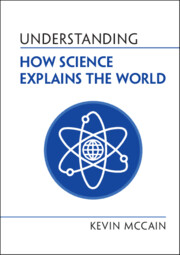Book contents
- Understanding How Science Explains the World
- Series page
- Understanding How Science Explains the World
- Copyright page
- Reviews
- Dedication
- Contents
- Foreword
- Preface
- Acknowledgments
- 1 Why Explanation Matters in Science
- 2 The General Nature of Explanation
- 3 Specific Kinds of Scientific Explanations
- 4 Explanation and Prediction
- 5 Evaluating Explanations
- 6 Explanatory Quality and Felt Understanding
- 7 False Theories, But Accurate Explanations?
- 8 From Explanation to Knowledge
- Concluding Remarks
- Summary of Common Misunderstandings
- References and Further Reading
- Figure Credits
- Index
4 - Explanation and Prediction
Published online by Cambridge University Press: 17 June 2022
- Understanding How Science Explains the World
- Series page
- Understanding How Science Explains the World
- Copyright page
- Reviews
- Dedication
- Contents
- Foreword
- Preface
- Acknowledgments
- 1 Why Explanation Matters in Science
- 2 The General Nature of Explanation
- 3 Specific Kinds of Scientific Explanations
- 4 Explanation and Prediction
- 5 Evaluating Explanations
- 6 Explanatory Quality and Felt Understanding
- 7 False Theories, But Accurate Explanations?
- 8 From Explanation to Knowledge
- Concluding Remarks
- Summary of Common Misunderstandings
- References and Further Reading
- Figure Credits
- Index
Summary
In this chapter we’re looking at the relation between scientific explanations and predictions. It is tempting to think that the only difference between explanations and predictions is that one looks back and tells us how or why things happened as they did, and the other looks forward and tells us how or why certain things will (or are likely to) happen. This thought can seem particularly plausible when we consider that in many cases a good scientific hypothesis will both explain phenomena and allow us to make accurate predictions. Despite its initial plausibility, the idea that explanation and prediction are symmetrical is mistaken. The way to see this is to take a look at a particular theory of scientific explanation that entails this relationship between explanation and prediction. The particular theory of scientific explanation in question, the covering law model, which we discussed in Chapter 2, is false. One of the reasons that this theory of explanation fails helps illustrate the fact that explanation and prediction are not symmetrical.
Keywords
Information
- Type
- Chapter
- Information
- Understanding How Science Explains the World , pp. 43 - 54Publisher: Cambridge University PressPrint publication year: 2022
Accessibility standard: Unknown
Why this information is here
This section outlines the accessibility features of this content - including support for screen readers, full keyboard navigation and high-contrast display options. This may not be relevant for you.Accessibility Information
- 1
- Cited by
